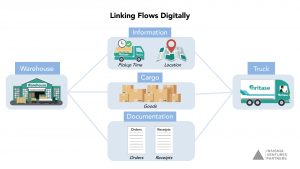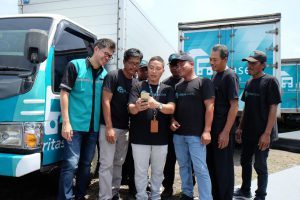Indonesia’s fragmented logistics industry poses numerous opportunities for technology companies to step in, but what approach will truly create impact? In this IBR interview, Ritase’s Iman Kusnadi shares his perspective on tackling the fragmentation and stories from the ground driving digital transformation in shipping and trucking sectors. The former DHL supply chain GM and Sephora Digital SEA Director also talks about lessons from his shift from a long career in established multinationals to running a tech company in Indonesia.
IBR: What are your thoughts on Indonesia’s logistics industry? What is the biggest challenge it faces at this point in time?
Iman: You can look at logistics from three types of flows that happen simultaneously: cargo flow [ie how goods get from point A to point B], documentation flow [ie how paperwork moves from one office to another], and information flow [ie how the supply chain keeps track of movement]. In Indonesia it’s difficult to properly link cargo, information, or documentation flows, with everything running manually.
For example, FMCGs like Unilever and Nestle, while they both use SAP, manage their supply chains differently because there’s no standard in Indonesia for managing products from pickup to drop off.
So while it’s a huge market opportunity to tap into, it’s really a question of how you can manage all this opportunity, simplify processes and link up these different flows. This is where digital transformation comes in and where Ritase as a company works to create impact.

An illustration of how Iman’s flow perspective in a truck pickup case, and why inefficiencies in one cannot be solved without addressing the others
IBR: What was Ritase’s thought process getting into the trucking segment?
Iman: In order to get into the logistics or supply chain sector in Indonesia, you have to look at where inefficiencies in flows come from. If you just want to do cargo matching or uberize trucking, it doesn’t really solve the problem, because the inefficiencies in cargo matching begins with processes on the shipper side — order management, processing, and communication.
Even then it’s not just a question of getting shippers like FMCGs to use digital solutions, but also trucking companies. How do we get trucking companies to go digital and use transport admin systems and driver applications? If you talk to the trucking community, we’re dealing with many truckers who have never used banking or tech services. Sometimes they don’t even have proper warehousing.
Before information flows would just be done through Whatsapp, email, or phone broadcasts. Now all that can be consolidated into one platform. It’s difficult to change because our customers have been in business for many years. It all begins with market education.
So while there’s a lot of problems we can solve in the sector, and Ritase is tackling only a small portion of it, we believe it’s an important place from which to solve inefficiencies in Indonesian logistics.
In order to get into the logistics or supply chain sector in Indonesia, you have to look at where inefficiencies in flows come from. If you just want to do cargo matching or uberize trucking, it doesn’t really solve the problem, because the inefficiencies in cargo matching begins with processes on the shipper side — order management, processing, and communication.
IBR: How does your work in this space translate into cost saving for the shippers?
Iman: For example, we work with one of the biggest F&B companies in Indonesia. Before working with us, their goods have to be ready for pickup by 3 am in the morning, but they could only dispatch information to the trucking companies six hours later by 9 am.
By enabling the shipper to automatically transmit information and allowing the trucking companies to do their pickups earlier, we can reduce inventory turnaround in the warehouse by a day. With faster stock turnaround, shippers can increase cash flow and reduce overall logistics cost — not just your trucking cost because it includes the inventory management stock inside the warehouse.
For the larger multinational shippers, getting their buy-in is really all about price. Technology is only a nice-to-have for them. If you can get them a very competitive price, then they will be more willing to do the trial. Many FMCG multinationals are already using SAP, an ERP system with high level technology. They don’t really pay attention that much to the product itself, simply how much it could save them.
IBR: Initially Ritase started as a pure marketplace for shippers and trucks. Now you’ve evolved into offering a SaaS product and also your group buying service Ritshop. What was the thought process behind moving into these services?
Iman: Our goal is to become irreplaceable for our customers. For example, we own every single order in Jakarta for a multinational FMCG because they use our SaaS product. Now every shipper and trucking company who wants to service this FMCG will automatically make use of the Ritase platform. This strong point is why our SaaS product is our backbone.
Then because truckers are on our platform, when they need new trucks our marketplace can easily support them, even providing financing for these purchases through our group buying service. We also provide trucking companies financing to alleviate the pressure on cash flow from shippers’ terms of payment. For individual truckers, we built an ewallet on our platform that truckers can use to buy food or even cigarettes.
So what we’re building here aims to cater to the trucking ecosystem around the country. We want to make sure shippers, trucking companies, and even drivers using our platform benefit fully from the platform we built.

Iman and truck drivers using Ritase
IBR: Do you have some examples of how this ecosystem approach works for your customers?
Iman: Let me share two different stories of trucking companies that now use Ritase. The first one wanted to close down their business and sell their trucks because they weren’t getting orders and didn’t have enough cash flow to run on, with up to 35 trucks but only five or seven shipments a day. When they joined Ritase, we helped them with working capital and gave them more orders with a dedicated feed. They could activate all their trucks right away because we also provided financing.
In contrast, there was a trucking company in Surabaya where they initially turned down our offer because they already had customers and had been running the business for 15 years. Six months later, they came to us because one of their own customers was already using our platform.
So these two stories show how Ritase, as a solution for the entire trucking ecosystem, utilizes network effects both in terms of supporting the sector’s growth and lowering our customer acquisition costs.
IBR: Let’s talk about Ritase from a personal career perspective. What was the career transition like from working in corporate to becoming a founder?
Iman: The biggest difference is that I need to make sure that this company survives tomorrow, next year, and in the next five years. Working in corporate I didn’t think about these things. I need to take care of the sustainability of the business, making sure we have enough cash to run the business for at least the next two or three months. It’s definitely a challenge, but it helped me understand how difficult it is, not just to build a company, but to make it great.
IBR: What’s the biggest lesson you’ve picked up thus far as the founder of a technology company?
Iman: It’s the mindset change going from a traditional business into a digital one. For example, before I would think that simply increasing or reallocating manpower would solve inefficiencies but because of digital technology, I realized that it’s really about improving processes.
IBR: How does that mindset change reflect in how you build your team?
Iman: I also look at hiring from a process perspective now. For example, for an operation manager or COO, I used to think that I would simply need someone with 15 years experience running a logistics business. Now I realize that operations on Ritase runs like a factory. It’s a standard process from receiving orders up to sending proof of delivery. If it’s the same process and outcome, I don’t need a logistics veteran. I need someone with factory experience, with a Kaizen, Six Sigma black belt to run operations, someone who can manage all the moving parts in a process.
It’s all about hiring someone who has structured thinking. Someone who realizes that every process depends on upon other processes — the waterfall effect. The people I hire don’t have to be 100% from a logistics background.
So what we’re building here aims to cater to the trucking ecosystem around the country. We want to make sure shippers, trucking companies, and even drivers using our platform benefit fully from the platform we built.
Paulo Joquiño is a writer and content producer for tech companies, and co-author of the book Navigating ASEANnovation. He is currently Editor of Insignia Business Review, the official publication of Insignia Ventures Partners, and senior content strategist for the venture capital firm, where he started right after graduation. As a university student, he took up multiple work opportunities in content and marketing for startups in Asia. These included interning as an associate at G3 Partners, a Seoul-based marketing agency for tech startups, running tech community engagements at coworking space and business community, ASPACE Philippines, and interning at workspace marketplace FlySpaces. He graduated with a BS Management Engineering at Ateneo de Manila University in 2019.